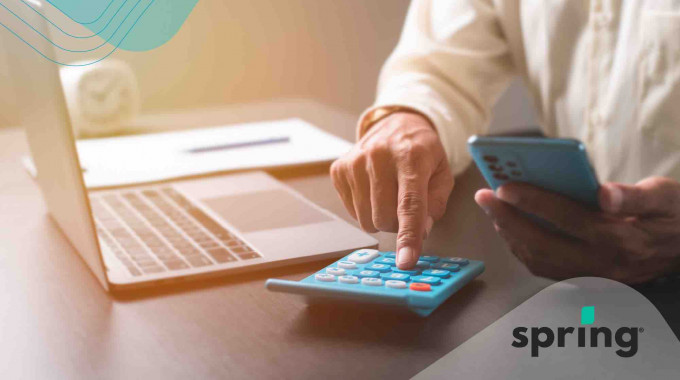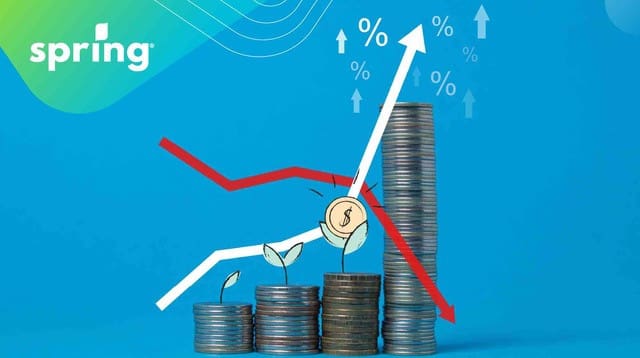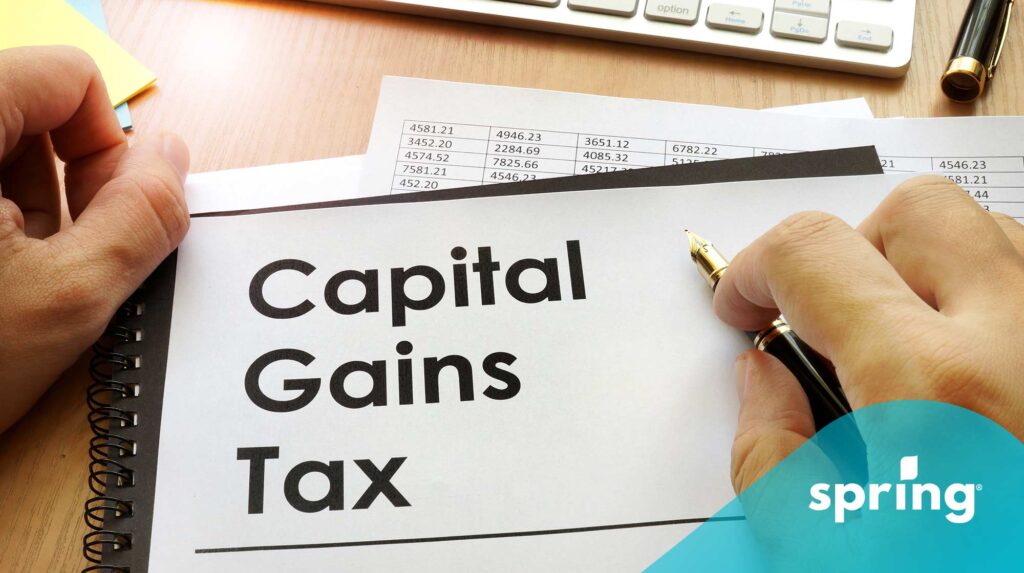On top of federal and provincial income taxes, there are other taxes that Canadians have to pay. Some of these are GST, HST, PST, QST and property taxes. While these taxes are dependent on where you live and if you own a home, they are everywhere. Taxes are how the federal and provincial governments are able to cover the cost of things. They help run our economy.
Federal Tax Brackets
Federal tax rates, also known as marginal rates, are what everyone pays, no matter where they live. While many people think the more money you make, the more taxes you pay, that is technically true, but it isn’t really that simple. It works because there are different tax brackets.
In each of the federal income tax brackets, everyone pays the same, and then the rate only rises in the next tax bracket. The amount that you pay in taxes is based on your adjusted gross income. The rates below are based on 2025 tax rates and don’t include your provincial or territorial rates.
| Tax Bracket | Tax Rates |
| $58,523 or less | 14.0% |
| $58,523 to $117,045 | 20.5% |
| $117,045 to $181,440 | 26% |
| $181,440 to $258,482 | 29% |
| More than $258,482 | 33% |
While these amounts are subject to change every year due to things like inflation, this is a basic idea of how tax brackets work in the federal tax system.
For example, if you make $35,000 per year, then you pay 14% tax on that full amount. If you make $75,000 per year, then you pay 14% on $58,523 of that, and the remaining $16,477 of your income, you will pay 20.5% of that in taxes.
It is important to keep in mind whether you file federal individual income taxes or a joint family income tax return. When you are living on your own and filing federal individual income tax, you are likely to have a lower income than a dual-income household. You may notice when you stop filing individually that you stop receiving some government tax credits like the GST/HST credit, since your joint family income is now over the threshold.
The Average Taxes Canadians Pay Per Year
Since everyone makes a different gross annual income, the net income is going to be different for everyone, so it is hard to say how much people pay every year in taxes. That being said, though, based on the 2021 tax year, the average Canadian pays 25.1% of their gross annual income in both provincial and federal income taxes combined. That means the average yearly net income is only 74.9% of the gross annual income. This may be higher or lower for you, depending on what tax bracket you fall into and what province you live in.
Provincial/Territorial Tax Brackets
Canadian income tax rates vary depending on where you live in the Country. There are individual provincial and territorial income tax rates that you also have to pay. Your total tax payable is based on your combined federal and provincial tax rates, your provincial tax bill isn’t separate. The following table shows these amounts.
| Provinces/Territories | Tax Rates |
| British Columbia Income Tax Rates | 5.06% on amounts from $0 – $50,3637.7% on $50,363- $100,72810.5% on $100,728 – $115,64812.29% on $115,648- $140,43014.7% on $140,430 – $190,40516.8% on $190,405 – $265,54520.5% on $265,545 and over |
| Alberta Income Tax Rates | 8% on the first $61,20010% over $61,200 up to $154,25912% over $154,259 up to $185,11113% over $185,111 up to $246,81314% over $246,813 up to $370,22015% over $370,220 |
| Saskatchewan Income Tax Rates | 10.5% first $54,53212.5% over $54,532 up to $155,80514.5% over $155,805 |
| Manitoba Income Tax Rates | 10.8% first $47,00012.75% over $47,000 up to $100,00017.4% over $100,000 |
| Newfoundland and Labrador Income Tax Rates | 8.7% first $44,67814.5% over $44,678 up to $89,35415.8% over $89,354 up to $159,52817.8% over $159,528 up to $223,34019.8% over $223,340 up to $285,31920.8% over $285,319 up to $570,63821.3% over $570,638 up to $1,141,2721.8% over $1,141,275 |
| Nova Scotia Income Tax Rates | 8.79% on the first $30,99514.95% over $30,995 up to $61,99116.67% over $61,991 up to $97,41717.5% over $97,417 up to $157,12421% over $157,124 |
| Prince Edward Island Income Tax Rates | 9.5%% on the first $33,92813.47% over $33,928 up to $65,82016.60% over $65,820 up to $106,89017.62% over $106,890 up to $142,25019% over $142,250 |
| Ontario Income Tax Rates | 5.05% on the first $53,8919.15% over $53,891 up to $107,78511.16% over $107,785 up to $150,00012.16% over $150,000 up to $220,00013.16% over $220,000 |
| Quebec Income Tax Rates | 14% on the first $54,34519% over $54,345 up to $108,68024% over $54,345 up to $108,68025.75% on amounts over $132,245 |
| New Brunswick Income Tax Rates | 9.4% on the first $52,33314.0% over $52,333 up to $104,66616% over $104,666 up to $193,86119.5% on amounts over $193,861 |
| Northwest Territories Income Tax Rates | 5.9% on the first $53,0038.6% over $53,003 up to $106,00912.2% over $106,009 up to $172,34614.05% on amounts over $172,346 |
| Yukon Income Tax Rates | 6.4% on the first $58,5239% over $58,523 up to $117,04510.9% over $117,045 up to $181,44012.93% over $181,440 up to $258,48212.80% over $258,482 up to $500,00015% on amounts over $500,000 |
| Nunavut Income Tax Rates | 4% on the first $55,8017% over $55,801 up to $111,6029% over $111,602 up to $181,43911.5% on amounts over $181,439 |
Federal Vs Provincial Income Tax Rates
When it comes to income taxes, there are federal income tax rates that you pay out of your income to the federal government. However, taxes also have to be paid to the provincial government. For this reason, you have both federal and provincial tax rates.
Federal income tax rates are the same for everyone and are paid based on your annual income. Provincial tax rates are also based on your income, but they vary based on which province you live in. However, they are paid at the same time that you pay your federal income taxes.
With both types of taxes, though, you have refundable tax credits and non-refundable tax credits. These include dividend tax credits, personal tax credits, and pension adjustments like the Canada Pension Plan. These can be claimed to reduce both your provincial and federal income tax amounts.
The main difference between federal and provincial income tax rates is the basic personal amount. This is the personal exemption amount that you don’t have to pay taxes on in a calendar year. The amount for 2025 is $16,129, but it is lower than for previous tax years of your income tax and benefit return. It will be calculated manually for business income and automatically for employee returns.
What to Claim When You File Your Taxes
If you work for someone else, you will likely get a T4 for the income you received as employment income for the year. A basic tax return means you just file this and either receive a tax refund or not. Before you file your basic return, though, you should verify if there is anything else you can claim for a tax break.
Claiming these tax breaks could mean that the income taxes you paid were more than you should have paid and that you qualify for a refund. Since working from home is something that has become more and more common recently, claiming this on your taxes counts as a tax break. Some other examples would be:
- Medication costs
- Medical expenses
- RRSP deductions
- Tuition Payments/Supplies
- Capital Losses
- Any bills or supplies your job requires (you can ask your employer)
- Excise Taxes
- Interest paid
You also need to claim any other total income you may have received, such as:
- Side hustle income
- Rental Income
- Capital Gains (such as investment profits or profits from a property sale)
- Employment Insurance Benefits
- WCB Payments
Of course, there are many other tax breaks you could get or income sources you could have, depending on your personal circumstances and if you are unsure, a tax professional will be able to help you.

Self-Employment Taxes
Taxes for those who are self-employed can be much more complex than just a normal T4. This is mainly because you aren’t paying taxes monthly off of your paychecks(payroll taxes). You are receiving your full income and then need to pay your taxes in one lump sum.
When it comes to self-employment, though, there are plenty of write-offs, also referred to as tax deductions, you are allowed to claim in order to ease your tax bill.
What these write-offs are depends on your business and its logistics. You are allowed to write off any purchases you made in order for your business to run, as well as any bills that occur that also pertain directly to your business. The specifics can get tricky, though, which is where a professional accountant can help you make the right deductions using the Canadian tax system, since there are various deductions available.
Taxes and RRSPs
Claiming your RRSPs on your taxes is a great way to get a tax break while saving for retirement or a home. You do not pay taxes on these unless you pull the money out before you retire or purchase a home.
If you use the funds as a down payment on your first home, you have around 15 years to pay the money back into your RRSP. If you take the funds out for this reason or don’t pay the money back in time, you are charged a penalty that is called a withholding tax.
Alternatively, taxes can reduce your total tax bill for the tax year as well. This happens when you claim your RRSP contributions. Since you don’t pay tax on RRSP contributions until they’re taken out, you’ll receive the tax you paid on any RRSP contributions as a tax refund or a deduction on your tax balance that’s also known as a tax credit. However, you will have to pay a penalty if you go above your RRSP contribution room.
How Capital Gains Work When It Comes to Taxes
Capital gains are one of those things that confuse a lot of people when it comes to filing their taxes. You may think that because you don’t invest in the stock market, practice day trading, or receive dividends, it isn’t something you need to think about, but the term capital gains isn’t just referring to the stock market; it’s any type of investment where you earn more than you spent.
The actual definition of a capital gain is profit from a property sale or an investment. This means any profits that you make when you sell your home, also known as investment income, are considered capital gains and need to be reported on your yearly tax return.
Whether you sell a home or an investment, the process for claiming a capital gain is the same. The inclusion rate of your taxable gain is 50% to 66.66% instead of the whole amount, and it is included in your annual taxable income. Instead of being taxed at your income tax rate, though, it is taxed at marginal tax rates.
This is because they are over and above your personal income source, so it is calculated differently than your personal income tax, regular income, which means you pay less tax on these amounts. However, properties that aren’t your place of residence are taxed at a rate of 66.67% on amounts over $250,000.
Offsetting Capital Gains
Capital gains really start to get confusing when you have capital losses as well. Capital losses are defined as when an asset/investment has decreased in value or is sold for less than the purchase price. Just like capital gains, this includes homes as well.
Every year, you have an allotted amount of capital gains and losses that you are allowed to apply. Without capital losses, you are allowed to use them to offset a part of the 50% of your capital gains to reduce the amount you pay in taxes.
When it comes to claiming capital gains and losses on your taxes, you want to make sure that you are doing it correctly in order to avoid any problems in the future. The best way to do this is to see a financial advisor as well as a tax professional to help with offsetting. This part of your taxes can often be very difficult to figure out on your own, especially when every situation is different. Seeing a professional can help clear up the fine details for you.
GST, HST, PST, QST
These different taxes are Canadian sales taxes that are applied differently in each province. This means how much tax you pay is based on where you live.
GST
GST stands for the Goods and Services Tax. This tax is a 5% levy added by the federal government to almost all goods and services. While this tax is applied throughout the whole country, some provinces and territories have other taxes, and some only use GST.
HST
HST stands for the Harmonized Sales Tax. This tax is a combination of the GST and PST that some provinces and territories use instead of separate taxes. Most provinces/territories that use HST charge 15%, except Ontario, which charges 13%.
PST
Certain provinces and territories charge an additional tax known as the Provincial Sales Tax. Depending on the province/territory where you are being charged, the tax will determine the percentage.
QST
The QST is the provincial sales tax that is only set in Quebec, also known as the Quebec Sales Tax. This tax is set at 9.975%.
Taxes Paid in Each Province
Each province charges a different amount of taxes on their goods. Here are the taxes charged in each province or territory.
| Provinces/Territories | Applied Taxes | Percentages | Total |
| British Columbia | GST + PST | 5% + 7% | 12% |
| Alberta | GST | 5% | 5% |
| Saskatchewan | GST + PST | 5% + 6% | 11% |
| Manitoba | GST + PST | 5% + 7% | 12% |
| New Brunswick | HST | 15% | 15% |
| Prince Edward Island | HST | 15% | 15% |
| Newfoundland and Labrador | HST | 15% | 15% |
| Northwest Territories | GST | 5% | 5% |
| Nunavut | GST | 5% | 5% |
| Ontario | HST | 13% | 13% |
| Yukon | GST | 5% | 5% |
| Nova Scotia | HST | 15% | 15% |
Province with the Lowest Taxes
There are many different taxes that fall within the provinces and it can get quite confusing. When it comes to overall taxation, the province with the cheapest taxes is Alberta. While the Yukon is also at a GST rate of only 5%, Alberta does have the overall cheapest taxes for taxpayers for both sales tax and personal tax.
Province with the Highest Taxes
The province with the highest taxes is Quebec. The main reason for this is that the Quebec government finances things that other provincial governments do not. Other provinces that follow closely behind Quebec are:
- Newfoundland and Labrador
- Nova Scotia
- Prince Edward Island
- New Brunswick
Eastern Canada, in general, has much higher rates of taxes than Western Canada.
Province with the Highest Property Taxes
The prices of taxes or the prices of homes in Canada have nothing to do with the rates of property taxes. While New Brunswick is one of the cheapest places to live in Canada, it also has the highest property taxes as well as the highest taxes on goods and services. This in itself doesn’t directly affect the overall cost of living, though.
Province with the Lowest Property Taxes
Ironically, the province with the lowest property taxes in British Columbia. It is home to Vancouver which is the most expensive city in Canada. While many places in BC have some of the highest housing prices, they also have the lowest property taxes based on the percentage charged on the total value of the home.
Alberta Vs BC Income Tax Rates
Even though BC and Alberta are close geographically, their income tax rates are very different. In Alberta, a flat rate of 8% is paid on the first $61,200 and then 10% is paid on amounts from $61,200 to $154,259. These two rates will include a good amount of the working population.
In BC, you pay 5.06% on the first $50,363 and then 7.07% on amounts from $50,363 to $100,728. The rates on amounts from $100,728 to $115,648 are 10.50%, and the rate from $115,648 to $140,430 is 12.29%. The rate then for amounts $140,430 to $190,405 is 14.70%. This is calculated very differently from BC.
You’ll notice that the lower amounts in Alberta actually have less taxes, but then BC taxes become a bit cheaper when you reach the higher income ranges. So, comparably, they aren’t actually that different.
Quebec Vs Ontario Income Tax Rates
Taxes in Quebec are different from those in any other province. This is because it’s the only province where you have to file two different tax returns. One to the federal government and one to Revenue Quebec. In Ontario, you only have to file one income tax return.
While both the federal amounts are the same for the two provinces, the provincial amounts are different. In Quebec, there are four different tax brackets, and in Ontario, there are 5. Each of these tax brackets falls at different amounts and different percentages. You could make the same amount in each province, but you would pay different income tax amounts.
Alberta Vs Ontario Income Tax Rates
While both of these provinces have the same federal tax rates, different provinces deduct income taxes differently. The differences in these Canadian tax brackets may seem small, but they can affect your average tax rate, depending on where you live. In fact, Alberta is known for having some of the lowest taxes in Canada. That have larger tax brackets, whereas Ontario has smaller ones.
When it comes to taxes on items, Alberta only charges GST, whereas Ontario charges HST. This makes purchases less expensive in Alberta since there is no tax. This contributes to the reasons that Alberta is one of the most affordable provinces in the country.
Ontario Vs BC Income Tax Rates
Whether you earn passive income or regular income, you need to consider the tax rates for 2026 where you live, since each province has different rates. What you’re taxed on is based on your taxation years, your earned income, and any income increases that you receive. This can even impact the consumer price index.
While the alternative minimum tax is federal, your personal income tax return is also affected by provincial tax rates. In both BC and Ontario, the provincial tax rates are similar, even though there are some slight differences. This is the same with the tax charged on items. Ontario charges 13% HST, and BC charges GST and PST, adding up to 12%.
Income Earned In Other Countries
If you live in Canada and pay Canadian taxes, then you also have to pay taxes on your Worldwide income. Due to worldwide tax treaties, there isn’t any double taxation. This works the same for those who earn Canadian income in other countries, which is considered non-resident income and is taxed through that country and not Canada.








